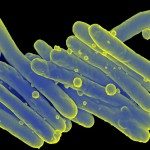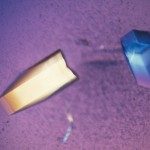Link to Pubmed [PMID] – 20961671
Eur J Med Chem 2010 Dec;45(12):5833-47
The 8-, 9-, 10-, and 11-halo, hydroxy, and methoxy derivatives of the antimycobacterial 3,3-dimethyl-3H-benzofuro[3,2-f][1]benzopyran were synthesized by condensation of the diazonium salts of 2-chloroanilines (13-17) with 1,4-benzoquinone (18), reduction of the intermediate phenylbenzoquinones 19-22 to dihydroxybiphenyls, cyclisation to halo-2-hydroxydibenzofurans 24-27, and construction of the pyran ring by thermal rearrangement of the corresponding dimethylpropargyl ethers 35-38. Palladium catalyzed nucleophilic aromatic substitution permitted conversion of the halo to the corresponding hydroxy derivatives which were methylated to methoxy-3,3-dimethyl-3H-benzofuro[3,2-f][1]benzopyran. All compounds substituted on the A ring were found more potent than the reference compound 1 against Mycobacterium bovis BCG and the virulent strain Mycobacterium tuberculosis H37Rv. The effect of the most active derivatives on mycolate synthesis was explored in order to confirm the preliminary hypothesis of an effect on mycobacterial cell wall biosynthesis. The linear 9-methoxy-2,2-dimethyl-2H-benzofuro[2,3-g][1]benzopyran (46) exhibiting a good antimycobacterial activity and devoid of cytotoxicity appeared to be the most promising compound.



